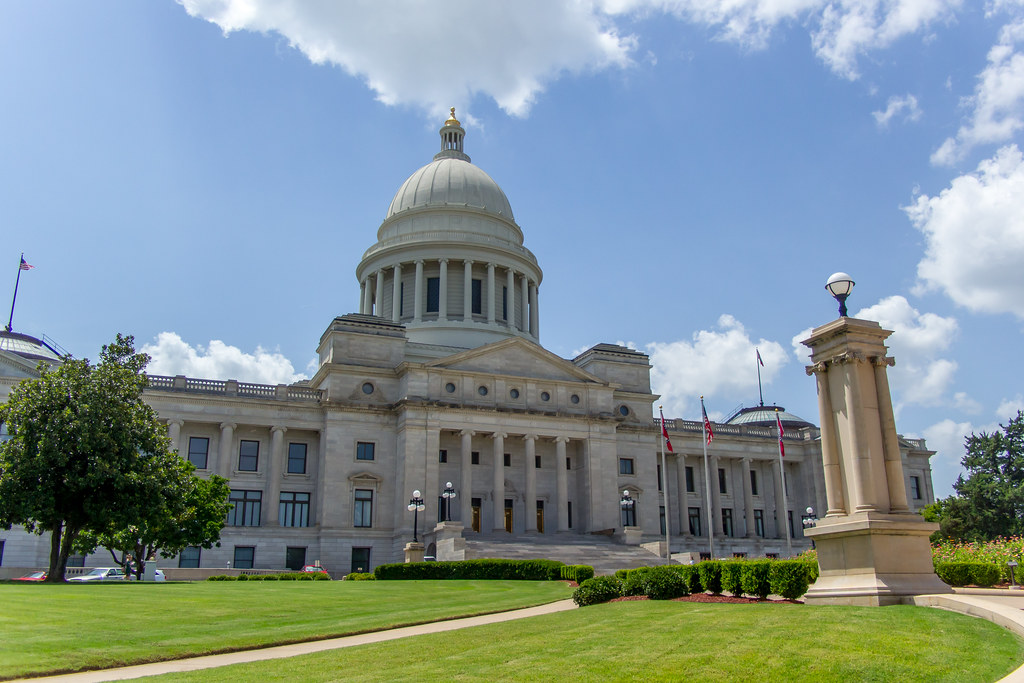By Michael Adkison
LITTLE ROCK, Ark. (UATV) — Arkansas is one of just three states in the U.S. without any hate crime laws. A new bill in the state legislature could change that.
The bill—announced by Governor Asa Hutchinson back in August 2020—creates a sentence enhancement when a perpetrator is motivated by the victim’s race, gender, physical abilities, or other attributes.
With bipartisan support, particularly from Hutchinson, the bill made national news when it was announced. But as state lawmakers returned to Little Rock this month, the bill could face an uphill battle, as some prominent officials, particularly conservatives, have criticized it.
Arkansas, Wyoming, and South Carolina do not have any hate crime legislation.
On January 11, the bill was sent to the State Senate Judiciary Committee, where the bill’s sponsor Jim Hendren is a member, and the House Judiciary Committee.
What does the bill propose?
If passed, the hate crime bill would create a sentence enhancement when the perpetrator of a crime is motivated by the victim’s personal attributes.
In other words, should someone commit a crime, and they were motivated by the victim’s race, gender, physical abilities, or other attributes, the criminal would receive the standard sentence, which is then increased by as much as 20%.
For example, a criminal sentenced to ten years in prison and a fine of $1,000 without the sentence enhancement, would then be sentenced to twelve years in prison and a fine of $1,200 with the sentence enhancement.
The bill also proposes criminalizing false accusations of a hate crime.
Whom does the bill protect?
The bill protects any victim when the perpetrator in a crime was motivated by the victim’s race, religion, sex, sexual orientation, gender identity, ancestry, color, ethnicity, disability, military service, homelessness, or nationality.
Notably, the bill’s definition of “disability” does not include compulsive gambling, kleptomania, pyromania, alcoholism, or drug use.
Who supports the bill?
The bill has bipartisan support within the Arkansas state legislature. Its lead sponsors are President Pro Tempore of the state Senate Jim Hendren (R-2) and Rep. Frederick J. Love (D-29).
Other sponsors in the state House of Representatives include Reps. Nicole Clowney (D-86), Jamie Scott (D-37), Fred Allen (D-30), Reginald Murdock (D-48), David Fielding (D-5), Milton Nicks, Jr. (D-50), Monte Hodges (D-55), Vivian Flowers (D-17), Kenneth B. Ferguson (D-16), Jay Richardson (D-78), Denise Jones Ennett (D-36), Joe Jett (R-56), Joy Springer (D-34), Jeff Wardlaw (R-8), and Tippi McCullough (D-33).
Sponsors in the state Senate include Sens. Joyce Elliott (D-31), Linda Chesterfield (D-30), and David Wallace (R-22).
Governor Asa Hutchinson has iterated his support of the bill multiple times, including in his State of the State Address on January 12. In the address, Hutchinson read letters from Arkansans across the state in support of the bill.
“The only way we can come together on this issue is for us to listen to each other, and to step into others’ shoes who live in a different world than ours,” Hutchinson said. “When we do this, then we can come together and find the best solution.”
Other prominent officials and organizations in support of the bill include state Attorney General Leslie Rutledge, Republican, the Arkansas Chamber of Commerce, Walmart, and Tyson.
Harrison, Arkansas, mayor Jerry Jackson has also supported the bill. Harrison is known for its ties to white supremacists and the Ku Klux Klan.
Who doesn’t support the bill?
Some conservative groups have criticized the legislation. One of its most outspoken critics is Jerry Cox, executive director of the Family Council. On January 7, he listed it as a “Bad Bill Filed” on his blog.
“Hate crime laws promote unequal justice, and they can carry serious, unintended consequences,” Cox wrote on his blog. “Ultimately, these laws end up punishing people for their speech and their beliefs instead of simply punishing them for their actions.”
The Family Council, he writes, notably objects to the law’s protections “based on sexual-orientation, gender-identity, and other characteristics.”
The Washington County Republican Committee wrote a rejection of the hate crime bill, saying “such expansion can… open the door to criminalization of other legitimate social behaviors considered by some to be politically incorrect.
Incoming Senate President Jimmy Hickey said he doesn’t believe the bill could pass, citing enhanced protections giving unequal treatment to certain groups.
“The main objection that I hear is from my conservative friends is that it gives some people more protection than others,” Gov. Hutchinson said in his State of the State Address. “This legislation applies equally. If you are Hispanic, and you are targeted, it applies. If you’re Jewish, it applies. If you’re a Caucasian, it applies. Or African American or any other race, it applies equally. It enhances the penalty for targeting regardless of the race that is targeted.”
“Let’s not be the last to enact it,” Hutchinson said. “But let’s lead and do what is important for so many.”


